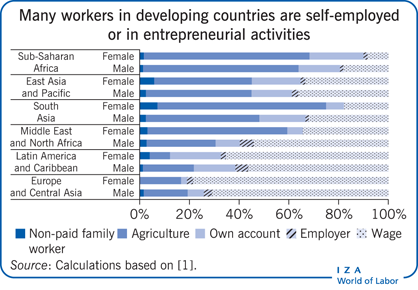Elevator pitch
Can entrepreneurship programs be successful labor market policies for the poor? A large share of workers in developing countries are self-employed in low-paying work or engage in low-return entrepreneurial activities that keep these workers in poverty. Entrepreneurship programs provide business training and access to finance, advisory, and networking services with the aim of boosting workers’ earnings and reducing poverty. Programs vary in design, which can affect their impact on outcomes. Recent studies have identified some promising approaches that are yielding positive results, such as combining training and financial support.
Key findings
Pros
Combining training and financing seems more effective than standalone programs in promoting labor market activities among poor self-employed workers.
Business training can facilitate business setup and improve business knowledge and practices.
Providing support customized to the needs of participants and including follow-up services improve program effectiveness.
Entrepreneurship programs for youth tend to yield better results.
Involving the private sector in the delivery of programs is associated with better results.
Cons
Entrepreneurship programs for the poor often show impacts that are small and not statistically significant, and the programs’ longer-term sustainability is unclear.
Improved business practice or knowledge does not automatically lead to business growth or job creation.
Little information is available on the cost of intervention, making comparing programs difficult.
There are many approaches to entrepreneurship programs whose effectiveness has not yet been analyzed.
